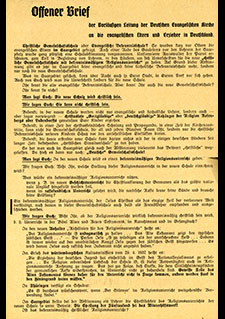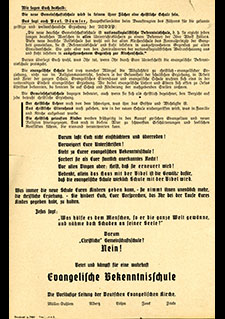“Denominational” vs. “Non-denominational" Schools
Nazi leaders curbed the churches’ public influence, especially in the sphere of children and young people’s upbringing for which it claimed the monopoly. To this end, it abolished not only denominational youth associations but also denominational schools at which students of a given denomination were taught by faculty likewise with denominational ties.
State and church had already contended with one another in the second half of the 19th century about the abolishment of denominational schools and the introduction of non-denominational Christian schools. The Weimar Imperial Constitution of 1919 had also envisioned the introduction of non-denominational schools as public schools. Since the passage of the planned Reich education act never ensued however, denominational schools also continued to constitute public schools in many places.
The Nazis held so-called “school referendums” in order to eliminate denominational schools. Such referendums were intended to give the appearance that the parents of school-age children and young people freely chose non-denominational schools.
Actually, they were put under tremendous pressure by the state and party authorities: In the run-up to the school referendum in Gau Saarpfalz in March of 1937, parents were threatened with the loss of their jobs and cuts in financial aid. Moreover, opponents of non-denominational schools were subjected to accusations of treason to the Fatherland.
The Nazi leadership also proceeded similarly in other regions. The policy of intimidation did not fail to have the desired effect, even among parents with church ties: The referendums led to overwhelming majorities for non-denominational schools.
There were certainly also voices within the Protestant church that advocated the introduction of non-denominational schools. One was Theodor Ellwein, an education expert and a member of the High Consistory in the German Evangelical Church’s highest administrative body.
They were met with firm rejection however in Confessing Church in particular. The Council of the Evangelical Lutheran Church in Germany, which was considered “moderate”, refused in a letter to Reich Minister of Education Rust of July 29, 1937 to recognize the referendum results as expressions of Protestant parents’ wishes. It demanded the retention of denominational schools and voiced the fear that religion class would be eliminated at non-denominational schools as the next step, as was already the case at the Adolf Hitler Schools and “National Political Educational Institutes”.
The “radical” wing of the Confessing Church combatted the abolition of denominational schools more offensively. Quoting one high party official, the Second Provisional Church Government clearly stated in an open letter to Protestant parents and educators what was to be expected from the promised “Christianness” of non-denominational schools under the Nazi state’s condition: a Nazi denominational school that was supposed to teach every young German to be a follower of Adolf Hitler’s idea in every school subject.
Since the non-denominational school, even if it labeled itself Christian, signified the renunciation of any convinced Christian education, the Provisional Church Government called upon parents and educators not to allow themselves to be intimidated and persuaded at the school referendums and to refuse to give their signature for non-denominational schools.
Source / title
- ©Evangelische Arbeitsgemeinschaft für Kirchliche Zeitgeschichte München, Nachlass von Soden 11


